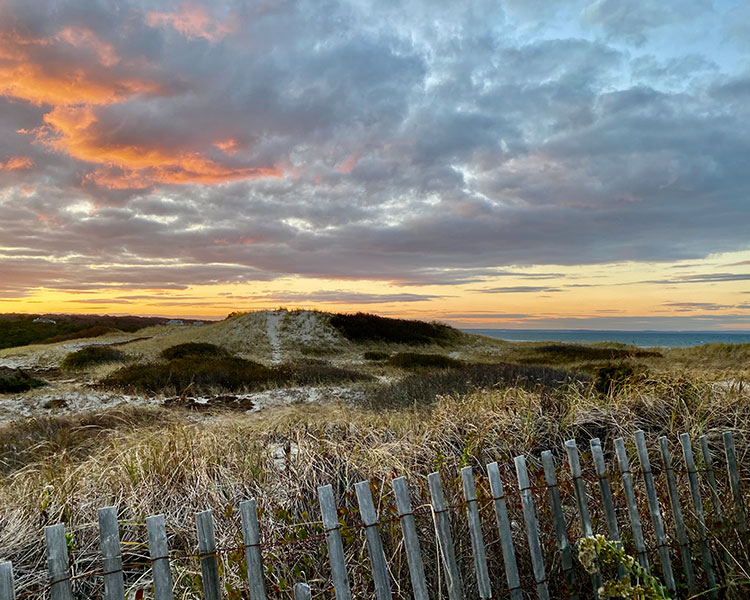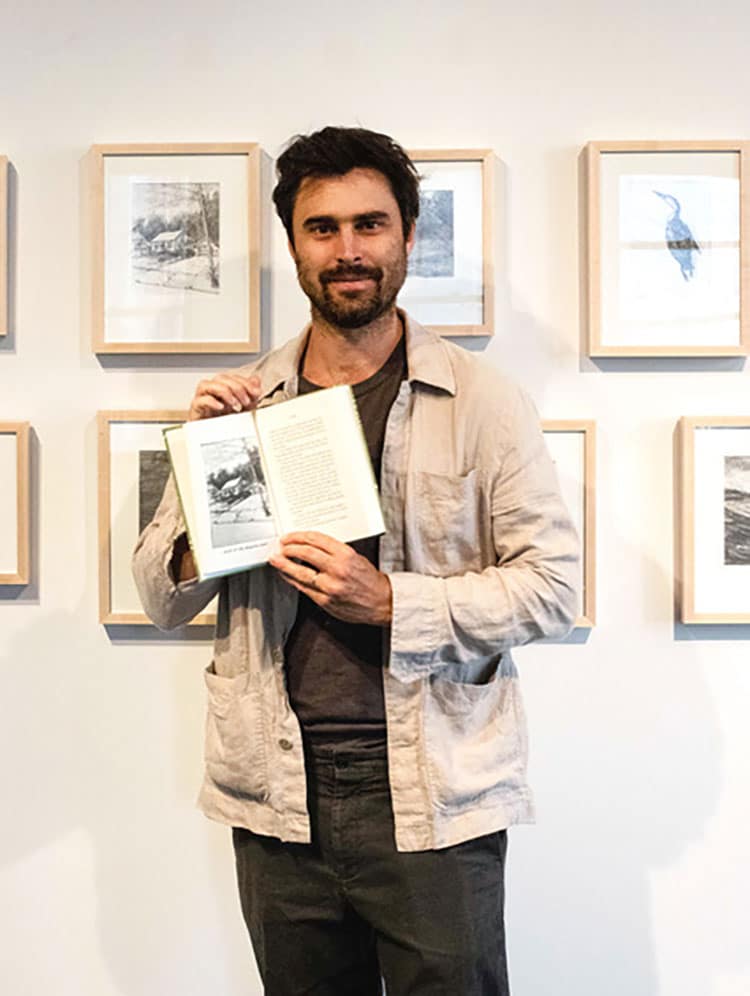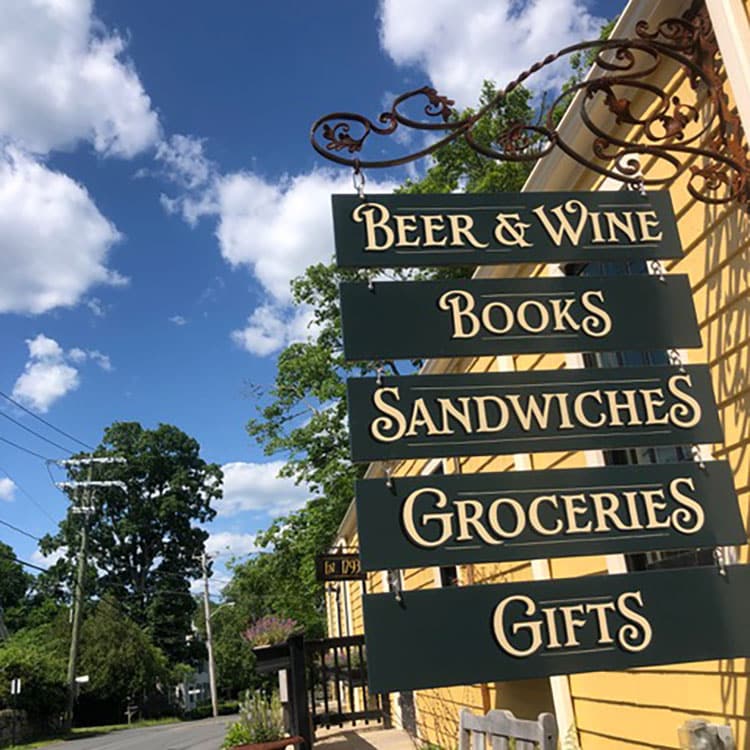
Walking Home
Cape Cod Life / August 2022 / Art & Entertainment
Writer: Chris White
Walking Home

Cape Cod Life / August 2022 / Art & Entertainment
Writer: Chris White
Author Ben Shattuck’s Journeys with Henry David Thoreau
As the world shut down in the spring of 2020, it seemed as though everyone in New England rediscovered walking. Normally deserted trails and beaches across Cape Cod sprang to life with people in sneakers and hiking boots, including residents and visitors who had never before climbed Sam Nye’s Mountain in Sandwich or trekked the length of Wellfleet’s Great Island all the way down to Jeremy Point. Some trail systems became so busy that visitors worried the outdoors might not actually offer protection from the pandemic, but as time went on, it seemed clear that outdoor activities were indeed safe. While news stories reported the rebound of the planet as the number of automobile drivers decreased dramatically, many families and individuals enjoyed the particularly peaceful reconnections with nature that arise from the slow pace of walks. A couple of years prior to the onslaught of COVID, author Ben Shattuck of South Dartmouth had begun to explore the healing powers of putting one foot in front of the other when he started writing his book Six Walks: In the Footsteps of Henry David Thoreau. However, it was during the lockdown he found the time and necessary tools to fully finish the project.

In April 2022, Tin House published Six Walks, and rave reviews have followed. Currently, Shattuck is in the midst of a region-wide promotional tour for his first book. Of Six Walks, the New Yorker wrote in its June 27th issue: “Although structured around a retracing of significant walks taken by Henry David Thoreau, this book quickly reveals itself to be less a historical reenactment than a series of meditations on the things that, now as then, fill our lives—breakups and new relationships, family history and its reverberations, nature and our rapidly changing place within it—all informed by Thoreau’s luminous, lyrical prose.” The Boston Globe wrote, “Part of the fun in Six Walks is how today’s reality—and Shattuck’s sense of humor—take over,” while the New York Times called Shattuck’s work “comforting,” adding that “It’s the sweetness in the sorrow that is captured in this writing, along with the natural world’s endless invitation to solace.”
Like many stories, Shattuck’s is one conceived in pain, but it’s also one of discovery, growth, and transformation. It begins during one of the coldest, snowiest winters in recent history, that of 2018. Shattuck was helping to carry a boat across icy ground, and he lost his grip. When the boat fell it chopped off part of his finger. His life was already at a bleak point after a shattering breakup, he was entering his mid-30s, and had no internet where he was staying. Insomnia and depression hounded him as he recovered, which made it difficult for him to maintain his attention for long enough to sink into reading novels or longer works of non-fiction—but then he came upon a book of selections from the journals of Henry David Thoreau, which Shattuck’s father had given him for Christmas one year. “I read a line about snow on a field in Concord,” Shattuck recalls, “and a description of bubbles trapped in ice. Then another paragraph about the sound of crickets in the morning. It was like a brick of gold.” Due to the format of the journals, Shattuck was able to savor small bites at a time, and soon his attention span began to widen. “I had always hated Thoreau in high school and college,” he says, “but that spring I was pretty low, and I read a lot of his stuff. I read his book Cape Cod and started to identify with him—he did most of his writing in his thirties, but I saw him as a curious millennial in an era of power that he disagreed with: the industrial revolution, deforestation, slavery. And I thought, ‘Here is someone trying his best to understand his place in the world.’” At the same time, Shattuck was aware that he was finding something in Thoreau that generations of literary minds had already brought to light. “It was like discovering Mozart and telling people about him,” he says. “And they say, yeah, we already know.” Nevertheless, his fascination with the transcendentalist author continued to wax as his insomnia persisted. “In between flashes of bad dreams—I thought really visually—I saw an image of a young man standing on a beach, alone. It was like a siren song,” he recalls. “With truly no preparation, I got in the car and drove to the Cape.”

Six Walks delves deep into Shattuck’s walk from Nauset to Provincetown, but it’s no spoiler to note that these first “footsteps” along Thoreau’s trail propelled the project forward. “I set out to take a walk, not six of them,” says Shattuck. “If that walk hadn’t offered so much—in terms of respite, small but significant revelations, beauty in the landscape, and experiences of running into strangers—the others would not have followed.” His only goal was to walk up the coast and to find the same house where Thoreau had spent a night. In fact, bringing a notebook along was practically an afterthought. Shattuck’s walk began one morning in May, and as he walked up the seemingly endless sands, he began to feel a “sensation of good luck.” Upon reflection, he says, “Walking is one of the ancient features that defines us as people. There’s something about the pace that affects you—it can really heal. And what Thoreau had observed was still there. I remember seeing a whale break the surface, and it was like something straight from his writing.”
Ben Shattuck wasn’t always a writer, but creativity and nature have always been essential to him. He grew up in an artistic, naturalistic family—his father William Shattuck is a painter and his mother Dedee is a former interior designer who has devoted much of her adult life to land conservation. Dedee is also the owner of the Dedee Shattuck Gallery in Westport, where Ben serves as the gallery director and lead curator. “I grew up understanding that the world has translations in the arts. It was like being a butcher’s son and realizing that what your parent does is something you can do with your life,” says Shattuck. Beginning in childhood, and continuing through high school, college, and beyond, he says, “I’ve been painting all along.” And yet, he traces his writing career back to a specific moment in his ninth grade English class. “I had written a story about home for Mrs. Heise, who was such a sweet woman,” he says. “She asked me to stay after class and told me, ‘This essay is very special. You should consider taking writing seriously.’” While his teacher’s encouragement stuck with him, Shattuck says, “I took a long, long break from writing. I studied art and architecture at Cornell, along with ornithology. After college, I worked on a few field studies of different birds: eiders, terns, western bluebirds.” For the western bluebird study, he was based in San Francisco, where he befriended someone who was interning at McSweeney’s, the publishing house that Dave Eggers founded in 1998. Shattuck took on an unpaid internship, and this led to a gig as a fact-checker for The Believer magazine. He took to the literary scene almost immediately and says, “I thought, ‘Ok, these are my people.’ It was like hearing a song you like. There’s no explanation. But it was fun to work with really ambitious, smart people who were making art together. I left McSweeney’s to attend the MFA program at the Iowa Writers’ Workshop, and right out of the gates I thought, ‘This is what I want to be doing for the rest of my life.’”

Iowa is to writers, as USC is to filmmakers, or Julliard is to dancers—and it’s a dynamic hub for both aspiring and world-renowned authors. During his two years in the Writers’ Workshop, Shattuck focused on the art of fiction by writing short stories and a graduate thesis that collected his most successful work. Since earning his MFA in 2013, he has published stories and articles in magazines ranging from Salon.com to Crazyhorse to The Harvard Review. In 2017, he won the PEN America Best Debut Short Story award for “Edwin Chase,” a novel excerpt, and in 2019 he bagged a Pushcart Prize for “The History of Sound,” a short story. He has also received about ten fellowships and residencies at such destinations as Bread Loaf, the Vermont Studio Center, and Alaska’s Gates of the Arctic National Park. Six Walks is Shattuck’s first published book, however—and his first serious foray into creative non-fiction. He has published essays on diverse topics such as the environment, the mistreatment of Native Americans on the Southcoast of Massachusetts, and mysteries of sea serpents and sailors swallowed by whales, but the personal nature of his Thoreau adventures opened new channels in his writing. “Non-fiction felt streamlined. I only have to follow lines of facts, of experience, history,” he explains. “It’s like a clothesline, and you drape the cloth of thought over it. Then cross winds of speculation cause it to blow in the breeze. It’s fact and thought, and the experience is totally enjoyable.” Shattuck still loves writing fiction, but the process that culminated in Six Walks gave him further perspective about both genres. “Non-fiction is more writing of the mind,” he says, “while fiction is writing of the heart. In fiction, you create an imaginative world of fact, but it’s like moving heavy blocks of plot, character, dialogue, believability—and meaning. It plumbs the depths of human experience.” Next up for Ben Shattuck is a return to fiction, and Viking Press has signed him for his first collection of short stories, due for publication in 2023, and a novel that should be forthcoming soon thereafter. “I’m also in the very early stages of adapting one of the stories for a film to begin shooting next spring,” he says.

For the time being, Shattuck has his hands full with his book tour, his various writing projects, the art gallery, and the Cuttyhunk Island Writers’ Residency, of which he is also the director. After postponing three times because of COVID, he married actress Jenny Slate on New Year’s Eve, just prior to the start of 2022. Earlier in 2021, the couple welcomed their first child, Ida Lupine. Because life wasn’t busy or full enough, Shattuck and his brother Will purchased Davoll’s General Store on Russells Mill Road in South Dartmouth, just down the street from their childhood home. Their team has transformed the 1793 building—in operation as a general store for 228 years—into a community center that includes a cafe & pub, bookstore, grocery market, and writing workshops. Davoll’s also offers events that range from musical jam sessions to author readings to book club meetings. Shattuck says that opening and running a small business is the “hardest thing [he’s] ever done,” but throughout all of these endeavors—or perhaps due to their confluence—he appears laid back, happy, and fulfilled. And in many ways, Six Walks and Thoreau are the wellsprings of his surging creativity. By the time he finished the last of Thoreau’s walks, he felt “really balanced” and reports “I don’t need Thoreau the way I did.” Still the lessons remain. Shattuck says, “That first walk was the foundation and cornerstone of the experience, and the first part of the book was about escape. The second part is about returning home.”
Chris White is a contributing writer for Cape Cod Life Publications.



